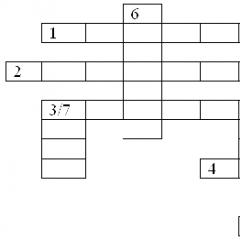Ugly girl presentation. Presentation for the lesson. Poem by N. A. Zabolotsky “Ugly Girl” presentation for a lesson (8th grade) on the topic. Preparing for expressive reading of a poem
To view the presentation with pictures, design and slides, download its file and open it in PowerPoint on your computer.
Text content of presentation slides: Guys, there is a set of letters on the tables in front of you. Your task is to form the word BEAUTY from letters
BEAUTY -1. units Everything beautiful, wonderful, everything that gives aesthetic and moral pleasure. Beautiful Russian nature. The beauty of poetic speech. To be distinguished by beauty. For beauty (to make it beautiful; colloquial). 2. pl. Beautiful, wonderful places (in nature, in works of art). Beauty of the South. The beauty of style. 3. beauty!, meaning. tale About something. very good, impressive, shine (in 3 digits) (colloquial). We walked and swam. Beauty! Explanatory dictionary of the Russian language. S.I. Ozhegov, N.Yu. Shvedova “What is beauty...” Lesson on the poem by N. Zabolotsky “ Ugly girl“Beauty is not in the face, beauty is the light in the heart. Gibran Khalil Gibran (Outstanding Arab writer and philosopher of the 20th century.)
N.A. Zabolotsky April 24 (May 7), 1903 - October 14, 1958 N.A. Zabolotsky “Ugly girl” Among other children playing, She resembles a little frog. A thin shirt is tucked into her panties, Rings of reddish curls are scattered, her mouth is long, her teeth are crooked, Facial features sharp and ugly. For two boys her age, their fathers bought them a bicycle. Today the boys, not in a hurry for lunch, are racing around the yard, forgetting about her, and she is running after them. Someone else’s joy, just like her own, torments her and breaks out of her heart, And the girl rejoices and laughs, Captivated by the happiness of being. This creature does not yet know a shadow of envy, not a malicious intent. Everything in the world is so immensely new to her, Everything is so alive, what is dead to others! And I don’t want to think, watching, that there will be a day when she, sobbing, Sees with horror that among her friends She is just a poor ugly girl! I want to believe that the heart is not a toy, It is hardly possible to break it suddenly! I want to believe that this pure flame, Which burns in the depths of her, alone will overcome all its pain And melt the heaviest stone! And even if her features are not good And there is nothing to seduce her imagination ,-The infantile grace of the soul is already visible in any of its movements. And if this is so, then what is beauty and why do people deify it? Values everyday life: Punctuality Hard work Thrift Responsibility Love of order Values of human relationships: Gratitude Respect Patience Sensitivity Ability to empathize Mercy Tolerance Fill out the self-assessment sheet, putting a “plus” where you completed the task, and a “minus” where you failed to complete it. Count the number of pluses and give a rating: “5” - 9-11 pluses ;"4" - 7-8 pluses; "3" - 4-6 pluses; “2” - less than 3 pluses.
Attached files
To use presentation previews, create a Google account and log in to it: https://accounts.google.com
Slide captions:
N.A. Zabolotsky Ugly girl Reading lesson in MSKOSH VIII type in Poronaysk Teacher Kozlova L.P.
Dignity - 1. Positive quality, value of someone or something. Alyosha...counted his friend's merits: his always affectionate attitude towards him, his willingness to help, his intelligence. 2. A set of highest moral qualities, as well as respect for these qualities in oneself.
What will a girl understand when she grows up?
How will she feel?
gj g Why does the poet hope that the girl will overcome the pain?
What will help with this?
What does Zabolotsky say about human beauty?
What beauty is the poet talking about?
What is inner beauty?
What does the poet compare it to in the poem?
A person acquires various values in life. Values of everyday life: diligence, punctuality, hard work, frugality, responsibility, love of order.
Values of human relationships Gratitude Respect Compassion Tolerance Tolerance - (lat.) patience
Values of the highest sphere of spiritual life Sensitivity Ability to empathize Mercy Mercy - in V. Dahl’s dictionary we read: mercy - sympathy, love in practice, willingness to do good to everyone, compassion, kindness.
up the ladder of life Choose moral values and create your own ladder of life. Gratitude Respect Compassion Tolerance Sensitivity Empathy Mercy
Thank you for your attention
On the topic: methodological developments, presentations and notes
Lesson summary. Poem by N. A. Zabolotsky "Ugly Girl"
The lesson is devoted to the problem of choosing moral values and aims students at self-development. Students do practical work and receive advice on self-education of moral values....
Presentation for the lesson "Poems by Russian poets of the 19th century about native nature"
In pdf format. If anyone needs a full-fledged presentation format, write. I'll send it by email....
Presentation for the lesson "Prose Poems by I.S. Turgenev"
laquo;My good reader, don’t run through these poems in a row: you’ll probably get bored and the book will fall out of your hands. But read them piecemeal: today one thing, tomorrow another - and which...
Literature lesson in 8th grade N.A. Zabolotsky "Ugly Girl"
Lesson type: learning new material.
Objective of the lesson: as a result of a comprehensive analysis of the text of a lyrical work, to identify its main idea, the author’s thought.
Tasks:
Educational and developmental:
Get acquainted with a new work, help identify main idea;
To help students understand what beauty is for N.A. Zabolotsky.
Educational:
Develop the ability to analyze, highlight the main thing, substantiate your judgments;
To develop the aesthetic taste of students.
Educational:
Through the analysis of N. A. Zabolotsky’s poem, form the concept of moral values and encourage students to self-development.
Equipment: slide show equipment; Each student has the text of the poem on the table; portrait of N.A. Zabolotsky; explanatory dictionaries.
Educational technology: personality-oriented, problem-based, dialogue learning, forms: collective, group;
Methods: partially search, research, problem-reporting, observation, as well as such types of relationships as subject - subject.
Three virtues adorn the soul:
beauty, wisdom and love.
A person must honor and
strive to comprehend them.
Jorge Angel Livraga
Man has two worlds:
The One who created us
Another one that we have been since forever
We create to the best of our ability.
N. A. Zabolotsky
Lesson progress
Updating students' knowledge.
1. Conversation with students:
- What, in your understanding, does the word beauty mean?
- How is a person beautiful and rich?
- Read the epigraphs of the lesson. How do you understand the words of Jorge Angel Livraga?
- What worlds is he talking about?N. A. Zabolotsky ? (external, around us, and internal, inside us). We pronounce the name of the poet N.A. Zabolotsky and immediately remember:
Don't let your soul be lazy!
So as not to pound water in a mortar,
The soul must work
And day and night, and day and night!..
The words seem like ordinary moralizing, although the author’s “you” is not addressed to the reader,
but to yourself. Or here's another:
And if this is so, then what is beauty?
And why do people deify her?
She is a vessel in which there is emptiness,
Or a fire flickering in a vessel?
The desire to unravel the mystery of the beauty of the soul and answer the question: “What is beauty and why do people deify it?” - forces the poet to create such a unique and amazing poem “Ugly Girl” (1955)
This poem caused a storm of controversy, completely opposite opinions that the secret of poetic inspiration was “lost” and, conversely, found in it. And again Zabolotsky surprises us and makes us think about this eternal question:
What is beauty?
2.Working with explanatory dictionaries
-Now let’s see how explanatory dictionaries reveal this substance.
-You and I must understand how the poet answers this question(communication of the topic and goals of the lesson).
2. Work on the topic of the lesson.
1. A task to develop semantic guesswork and the ability to predict.
-Read the title of the poem. Think about what a poem with that title might be talking about?(Statements from students)
2.Reading the poem “Ugly Girl” by heart by the teacher.
- Whose prediction turned out to be correct?
3. The concept of the theme and idea of the poem.
-What is the theme of the work? What is the theme of this poem?(This is a story about a little girl who rejoices with her friends - boys - at a new acquisition - bicycles - and runs after them around the yard).
-What is an idea? ( This is something you have to figure out; this is a secret that needs to be revealed; a riddle that needs to be solved).
4. Primary text analysis. Questions about what you read:
- What impression did the content of this poem leave on you?
- What is the meaning of the words “among other children playing”?
- Which inner world this girl?
- What is the happiness of life, according to the author?
5. Working with text (setting problematic issue):
- How many parts is this poem divided into, both visually and meaningfully?(For two). What type of speech is in each part?
- Which? Why did you come to this conclusion?(In the first - joy, jubilation, laughter, happiness; in the second - sobs, horror, ugly, pain, burden.)
- What is the main idea the author is trying to convey in the first part?(“poor ugly girl” in whose heart, however, “other people’s joy lives as well as her own”...)
-We see what can happen to the girl in the future. What is the author so afraid of?(students' answers).
-What about the second part?(The author's reflection on what he saw, the conviction in the strength and beauty of the human soul, that a miracle is happening to us: after all, although we remember the “ugliness” of the girl (portrait), we still admire her, because the poet allowed us to see precious fire hidden in this tiny creature. “No shadow of envy, no evil intention,” “everything in the world is so immensely new to her, everything that is dead to others is so alive!”
-What innermost thought does the author convey to us?(“The infantile grace of the soul, embraced by the happiness of being”).
6. Preparation for expressive reading of the poem.
Work in groups:
The first group prepares an expressive reading of the first part.
The second group prepares an expressive reading of the second part.
The third group carries out lexical work with words grace, twinkle.
A. Expressive reading of 1 part of the text by students of the first group.
1.What is discussed in part 1?
2. What attracts you to a girl? What role do the words “frog”, “shirt”, “rings”, “teeth” play in describing the girl? What do they have in common? (express the author’s attitude, emphasize the girl’s fragility and insecurity)
3. What means of expression does the author use to describe her?
A)resembles a frog (metaphor + comparison = metaphorical comparison)
B) thin (shirt), (mouth) long, (teeth) crooked, (features) sharp and ugly (epithets)
B) rings (curls) - metaphor.
4. Find a comparison. What is his role?(associations arise with the heroine of the fairy tale “The Frog Princess,” Vasilisa the Beautiful, turned into an ugly frog. Maybe the girl is also an enchanted princess, and the frog’s skin is just a shell?)
5. How does the illustration help you better imagine the girl’s appearance? Match the illustration with lines from the poem.
6. Yes, indeed, a poor girl, unsightly, ugly, even the boys don’t notice her, don’t see her joy, they forgot about her friend. And the author? Does he also treat her with some degree of disdain? Or not?
Student answers (no).
7.Prove it.(The girl is happy because his friends are happy: “other people’s joy, just like her own, torments her and is torn from her heart.” This ability to rejoice in the happiness of another elevates the girl above the world, the author begins to use different (book, high) vocabulary, the more Let's find these words and test ourselves.
B. Expressive reading of part 2 of the text by students of the second group.
1. What is it? last part poems?(the author's thoughts about the fate of the girl). Find duplicate lines. What is the point of repetition?
1. What will the girl understand when she grows up?
2. How will she feel?
3. Why does the poet hope that the girl will overcome her pain? What does “pure flame” mean, “will overcome the pain”, “will melt the stone”? What technique does the author use here? (metaphor).
4. What will help her with this?(“infantile grace of the soul”). How do you understand these lines?
5. What does N.A. Zabolotsky say about human beauty?
6. What beauty is the poet talking about?
7. What is inner beauty? What do you think about this?
8. What does the poet compare her to in the poem? Explain how you understand this? What does the author choose?(second, the beauty of the human soul). Prove it.
B. Lexical work.
Grace(Latin gratia - beauty, charm, grace), especially in movements and poses.
How do you understand the saying: “grace of the soul”?
Twinkle. Choose synonyms for the words. Why did the author choose this particular word?
(synonyms: blink, shine, sparkle, glow)
7. Conversation with students.
Why is such beauty “deified by people”? (this is very rare, very valuable quality).
The poet himself possessed these qualities. Contemporaries noted in him “the greatest tolerance towards people, restraint, delicacy, nobility, crystal honesty - what is included in the concept of “grace of the soul.” His poems cleanse and warm the reader’s soul).
Do you agree with the opinion of one of the modern critics: “Beauty is a fire that lurks for the time being in an ugly girl. But when the fire appears, the girl’s appearance will change. It will not seem ugly... Beauty is where it is not the fire that flickers in the vessel, but the vessel itself that flickers and glows”?
8. The teacher's word.
The poet believed that the beauty of the human soul was created by God, has bottomless depth, its own reality, its own charm, which reflects all the sorrow of existence.
Look at the reproduction of F. Rokotov’s painting “Portrait of A. Struyskaya”.
Describe the beauty of this woman.
Student message.
F. S. Rokotov painted portraits of the poet V. I. Maykov, A. I. Vorontsov, V. E. Novosiltseva, P. N. Lanskaya, a portrait of an unknown woman in a pink dress, etc. For the first time in the history of Russian painting, Rokotov’s portraits included the inner world of a person, his thoughts, feelings, and experiences are conveyed with great skill. The artist’s female portraits and, in particular, the portrait of A.P. Struyskaya, which attracts the viewer’s attention with the extraordinary spirituality of the young girl’s face, are particularly charming. The eyes are especially unusual in this portrait - lively, slightly sly and mysterious. It was the beautiful eyes of the heroine of the portrait that served as the source of inspiration for the creation of the famous poem Nikolai Zabolotsky “Portrait”: (expressive reading of a poem)
Love painting, poets!
Only she, the only one, is given
Souls of changeable signs
Transfer to canvas.
Do you remember how, from the darkness of the past,
Barely wrapped in satin,
From Rokotov's portrait again
Was Struyskaya looking at us?
Her eyes are like two fogs,
Half smile, half cry,
Her eyes are like two deceptions,
Failures covered in darkness.
A combination of two mysteries
Half-delight, half-fear,
A fit of mad tenderness,
Anticipation of mortal pain.
When darkness comes
And the storm is approaching
From the bottom of my soul they flicker
Her beautiful eyes.
9. Lesson summary.
Practical work. "Ladder of Life".
Teacher's word:
- “Sympathetic fire”, allowing someone else’s grief and joy to be perceived as one’s own, keen observational poetry of the truth of life and its heart, poeticization of people capable of true selfless love, restrained comparison of true beauty and happiness with imaginary sparkle - all this characterizes the poems of N.A. . Zabolotsky.
Student assessment.
10. Homework.
1. Learn the poem “Ugly Girl” by heart.



